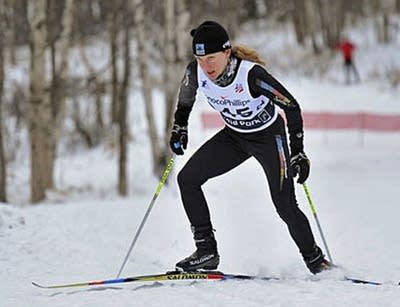Athletes scrape by to fund Olympic dreams
Go Deeper.
Create an account or log in to save stories.
Like this?
Thanks for liking this story! We have added it to a list of your favorite stories.

You've seen them: Olympic downhill skier Lindsey Vonn in Sports Illustrated; speed skater Apolo Anton Ohno on Dancing with the Stars, and even on the side of an Alaska Airlines jet.
But both Vonn and Ohno are the exception rather than the rule when it comes to earning the money they need to train and compete. Most athletes competing in this year's Winter Olympic Games in Vancouver were forced to scrape together their savings, ask for donations and put together a few modest sponsorships.
Caitlin Compton is a case in point. Compton, who was born in New York City but now calls Minneapolis home, will compete in Monday's 10-kilometer cross-country ski race in Vancouver.
Compton's Web site includes a prominently placed link for people interested in making a donation. And if you read her journal, you'll learn she recently had to move to a cheaper Minneapolis neighborhood when her apartment in the hip Uptown area got too expensive.
Turn Up Your Support
MPR News helps you turn down the noise and build shared understanding. Turn up your support for this public resource and keep trusted journalism accessible to all.
"My biggest concern has always been, can I afford to get to each race," Compton told MPR's Morning Edition before leaving for Vancouver.
Compton said choosing to work toward becoming an elite cross-country skier has never been about the money. Although Compton qualified for the Olympics, she's not a member of the U.S. Ski Team, meaning she's been unable to rely on the team for financial support.
"I've had to kind of reach out to find other ways to get the support, and get the means to continue competing," Compton said.
"You just have to decide how bad you want it, and you do what you have to do to go get it."
It"s not always easy: "You really have to love the sport," she said.
Those who follow Olympic sports marketing say most U.S. athletes must rely on their sports' governing bodies and the U.S. Olympic Committee for sponsorship money. But most of the sponsorship money tends to go to higher-profile sports and athletes, said David Stotlar, a professor of sports marketing and management at the University of Northern Colorado.
"When you get to the lesser known sports, the athletes are going on family funds. It's pretty sad," he said.
Unlike in other countries, the U.S. Olympic Committee doesn't receive money from the U.S. government, Stotlar said.
"I don't think we're in an environment right now where people are going to say, 'Let's devote a bunch of money to that,'" he said.
There are plenty of Olympic athletes who have full-time jobs, including two Minnesota members of the U.S. curling team.
John Benton, the lead for the U.S. men's team, works for Fairview Health Services. Some of his co-workers tried to donate vacation time to him. That didn't work out, but he's been able to work with his supervisors to find time to train, he said.
"Most days in the last 4-5 months, if I show up to work, people are like, 'What are you doing here? Why aren't you training? Go away. Go do what you need to do to make sure you're successful,'" he told Morning Edition earlier this month.
Pete Fenson, who was on the U.S. curling team that won a bronze medal in the 2006 Olympic Winter Games, said most curlers from the U.S. have full-time jobs.
"We're amateurs so we're in charge of paying the bills somehow," said Fenson, who still competes in curling while running a pizza joint in Bemidji, Minn. "You just have to decide how bad you want it, and you do what you have to do to go get it."
Some Olympic athletes have resorted to extreme forms of fundraising to earn money for travel and training expenses. In one example, a New Zealand taekwondo athlete has opened a brothel to finance his preparation for the 2012 Olympic Summer Games in London.
Compton prefers devoting some time to middle school students through a program called In the Arena, which enlists elite athletes to become role models and mentors for youth. In exchange, the athletes get a stipend.
"That's how I've been paying the rent, and that's how I pay for my car and things like that," Compton said. "I'm really blessed to have that."
Stephen Ross, a professor of sport management at the University of Minnesota, said it's a long shot for athletes in lesser-known sports like Compton's to suddenly become stars. But he said successful athletes have a chance.
"That probably drives most of it. Popularity of the sport also comes into it," Ross said.
The exciting thing about the Olympics, though, is it's hard to predict which athletes will emerge as the new stars.
"What story is going to come about over the next two weeks, and who's that next athlete going to be?" Ross asked. "Who's going to be the face of the marketing campaign?"
(MPR's Cathy Wurzer contributed to this report.)




